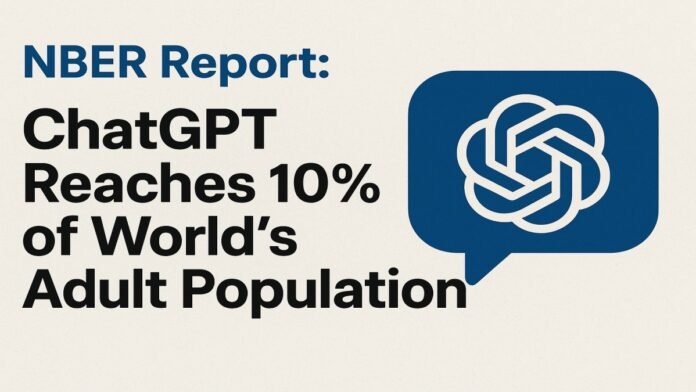
Key Points
- A comprehensive NBER study reveals that ChatGPT has reached 700 million weekly active users by July 2025, representing 10% of the world’s adult population.
- Users send over 2.5 billion messages daily, with the platform evolving from a workplace tool to a versatile personal assistant.
- The gender gap has closed completely, with slightly more users having feminine names than masculine names by mid-2025.
- Young users aged 18-25 account for nearly half of all messages, while adoption is growing fastest in low- and middle-income countries.
Ne Delhi: ChatGPT has achieved unprecedented global reach, according to a groundbreaking new study published by the National Bureau of Economic Research. The comprehensive analysis, conducted by economists and researchers from Duke University, Harvard, and OpenAI, provides the first detailed examination of how the world’s most famous chatbot is actually being used by its massive user base.
By July 2025, ChatGPT had attracted over 700 million weekly active users, representing roughly 10% of the entire world’s adult population. These users collectively send more than 2.5 billion messages per day, creating what researchers describe as an “unprecedented speed of global diffusion” that makes understanding the platform’s impact a societal necessity rather than mere technical curiosity.
Shifting Demographics and Usage Patterns
The study reveals dramatic changes in ChatGPT’s user demographics since its early days. While the platform’s initial user base was overwhelmingly male, comprising around 80% of early adopters, the gender gap has now completely closed. By mid-2025, users with typically feminine names slightly outnumber those with masculine names, indicating broad appeal across gender lines.
Age demographics show a strong skew toward younger users, with the 18-25 age group accounting for nearly half of all messages sent on the platform. This concentration among young adults suggests that ChatGPT is becoming deeply integrated into the daily lives of digital natives who are comfortable with AI-powered tools.
Global Democratization of AI Technology
Perhaps most significantly, the research highlights the rapid democratization of AI technology across economic boundaries. The report notes significantly faster growth rates in low- and middle-income countries compared to wealthier nations, suggesting that ChatGPT is breaking down traditional barriers to advanced technology access.
This global expansion pattern indicates that AI tools like ChatGPT are not remaining confined to tech-savvy users in developed countries but are instead becoming accessible to diverse populations worldwide, potentially reshaping how people across different economic contexts interact with information and complete daily tasks.
Evolution Beyond Workplace Applications
Contrary to initial expectations that positioned ChatGPT primarily as a workplace productivity tool, the study’s findings suggest the platform is evolving into something more versatile. Rather than serving mainly as a professional assistant, ChatGPT appears to be functioning as a comprehensive personal helper for everyday life, handling a wide range of queries and tasks that extend far beyond traditional work-related applications.
This shift challenges common assumptions about AI’s primary role in society and suggests that the technology’s most significant impact may be in how it assists with routine personal tasks rather than revolutionizing workplace productivity alone.


















































